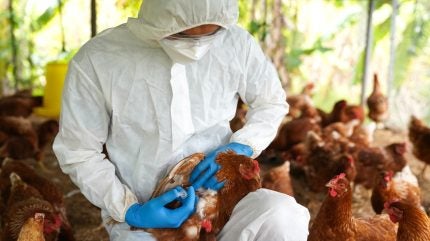
New Zealand has temporarily halted poultry exports after H7N6, a “high pathogenic strain” of avian influenza, was found at a commercial egg farm.
The decision to ban exports was announced by Biosecurity Minister Andrew Hoggard in the wake of the detection of the virus at the property in Otago.

Discover B2B Marketing That Performs
Combine business intelligence and editorial excellence to reach engaged professionals across 36 leading media platforms.
“Until we’ve cleaned up the situation on this farm, and assuming no other issues pop anywhere else, then we will be able to export again,” Hoggard told Radio New Zealand after the announcement.
“The incubation period is a maximum of 21 days, so we’ll know at that point what the situation is.”
Biosecurity New Zealand deputy director-general Stuart Anderson said tests had confirmed further cases of an H7N6 subtype of avian influenza in chickens in a second shed at the farm.
The farm, located in Hillgrove near Moeraki and operated by Mainland Poultry, is now under “strict” biosecurity controls to curb the movement of birds, poultry products, feed, and equipment on or off the property.

US Tariffs are shifting - will you react or anticipate?
Don’t let policy changes catch you off guard. Stay proactive with real-time data and expert analysis.
By GlobalData“The detection of further positive cases on the farm is not unexpected given the nature of the virus,” Anderson said.
To try to prevent the further spread of the virus, around 80,000 layer hens across two sheds will be humanely culled using CO2 gas.
The culling process, set to begin on Wednesday, is expected to take two to three days.
Anderson said the risk to human health “remains low” and emphasised there are no concerns regarding “food safety or wildlife.”
The property was issued a restricted place notice after tests confirmed the H7N6 strain in chickens from one of the sheds.
The virus likely originated from interactions between local waterfowl and wild birds, Biosecurity New Zealand said.
Thorough cleaning and disinfection of the affected sheds will follow the culling, with the repopulation of the sheds only possible after biosecurity clearance.
Testing is underway across other sheds on the property, with no signs of avian influenza in neighboring poultry farms thus far.
Specialists from the Ministry for Primary Industries (MPI), including three veterinarians, are on-site conducting investigations, tracing connections to six other poultry farms, and collecting samples.
This is not the first biosecurity challenge for the farm, which experienced an outbreak of Infectious Bursal Disease Virus Type 1 in 2019.





